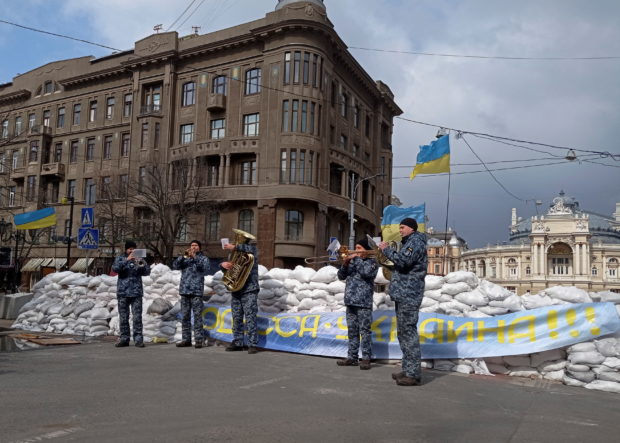‘Don’t Worry, Be Happy’: Behind sandbags, Odessa waits to see if it’s next

Ukrainian navy musicians perform in front of barricade made of sandbags near the opera theatre in central Odessa, Ukraine, March 8, 2022. REUTERS/Iryna Nazarchuk
ODESSA, Ukraine — From behind sandbags and anti-tank barriers in front of Odessa’s Opera and Ballet Theater, a familiar if unexpected melody drifted across the near-deserted streets of Ukraine’s main Black Sea port on Tuesday: “Don’t Worry, Be Happy.”
Odessa has so far escaped shelling but its one million people are nervously waiting to see if their historic city will be next to suffer the heavy Russian bombardment after Kyiv and Mariupol to the north and east.
The defiance is written in the giant blue and yellow banner “Odessa-Ukraine” draped atop the sandbags in the near-deserted city centre, and even music has been pressed into the national cause of raising morale.
“We did not surrender Odessa to Hitler, and we will not surrender it to anyone else,” said Galyna Zitser, director of the Odessa Philharmonic, which on Tuesday put on its first performance since the crisis began, at the request of a local company seeking to celebrate a holiday.
And in similar vein a handful of navy musicians in uniform put on an impromptu rendition of the national anthem, and Bobby McFerrin’s 1980’s chart hit about overcoming tribulations.
Article continues after this advertisement“I can’t say that I’m not scared, I am very scared, especially when we see this news, broken cities, dead soldiers,” Zitser told Reuters.
Article continues after this advertisement“We pray for the president, for our military, that God would give them the strength and health to protect us.”
The orchestra’s website strikes a similar tone, informing its audiences that concerts are postponed “due to the imposition of martial law in Ukraine” and urging them to stay calm and trust only “reliable official sources” before signing off: “Glory to Ukraine!”
The sea is central to Odessa’s status as an important trading, industrial and transportation hub.
High among people’s fears is the threat of attack from the water, across which lies the Crimean peninsula invaded and annexed by Russia in 2014.
Locals have been filling bags with sand on the beach and taking part in weapons training. And on Monday Ukraine’s navy said its forces defending the Odessa region hit a Russian vessel in the Black Sea with gunfire.
That threat means that Vasyl Miloserdnyi, 61, and his wife have not gone on their usual long sea walk since Russia’s invasion on Feb. 24.
Miloserdnyi said that from time to time they hear the distant sound of explosions and they, like their neighbors, have sealed their apartment windows with adhesive tape as a precaution.
But there has been no panic, he said – the shops have food, there is cash available, for now, and farmers from surrounding villages bring milk, meat and eggs to the markets.
“Odessites did not panic, they did not pull the last pieces of food off the shelves,” he said. “We hope that all this will be resolved soon, it will end.”
A spokeswoman for the mayor said they had no statistics on how many residents had left the city. She said there were many at the railway station from different towns around the Odessa and Kherson regions, mostly waiting for evacuation trains going mainly to Lviv in the west.
Russia calls its actions in Ukraine a “special operation” that is not designed to occupy territory but to destroy its neighbor’s military capabilities and capture what it regards as dangerous nationalists. It denies targeting civilians.
RELATED STORY:
Ukraine says two commercial ships hit by Russian missiles near Odessa port